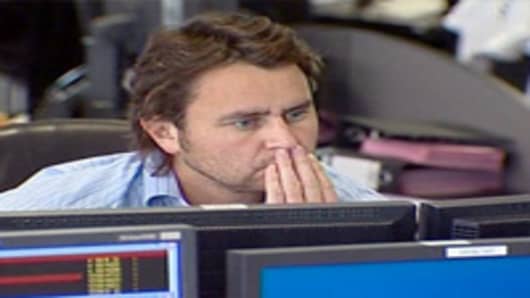The tumult Friday over fraud accusations against Goldman Sachs is likely to add to the deep mistrust among investors that the market is rigged against them.
How long that sentiment lasts could depend on whether the accusations against the Wall Street banking titanstick, and if they are symptomatic of a larger contagion within the trading practices of major institutions.
Either way, Securities and Exchange Commission allegations that Goldman misled investors about the subprime mortgages it sold them does not help build confidence that financial markets are operating fairly.
"This makes the investor sit back and say, 'This is exactly why I'm not in the market. It's a good-old-boy network,'" says Keith Springer, president of Capital Financial Advisory Services in Sacramento, Calif. "It's not going to sit well with the public."
Though a notoriously resilient crowd, investors have stayed away from the market since the financial system began crumbling in 2007. Volume has remained low even during the remarkable run since March 2009 that has seen the major averages gain more than 70 percent.
Despite the huge rally, some $2.9 trillion remains parked in cash, earning virtually nothing in money market funds. The latest controversy is likely only to feed suspicion and keep more investors away from a rally that many believe is not over.
"That sounds like an individual or retail investor's reaction, and I don't believe too many retail guys came out of money markets since last March yet," says Jordan Kimmel, market strategist at National Securities in New York and a believer in the rally. "A lot of people are in disbelief completely about the economy and the markets."
Investors may only be hurting themselves by refusing to participate. But the fear remains that shadowy power brokers are manipulating the Wall Street trading arena and have coalesced against the average investor.
"That's a widely held view by less sophisticated investors. This could certainly be putting an exclamation point on that viewpoint," says Rob Lutts, CIO and president of Cabot Money Management in Salem, Mass. "I've been a professional investor for 27 years. The market generally works pretty well."
Yet at least part of the reason investors have grown suspicious is because of the increasingly complex and less transparent products that helped bring about the crash in 2008.
While terms like collateralized debt obligations and credit default swaps have become more common in investor vernacular, many still don't understand how they work. They're likely to become even more befuddled and frustrated when such terms are thrown around in cases like Friday's shocking news regarding Goldman.
Part of the allegations center around whether Goldman packaged securities that were likely to fail and then didn't tell investors that a hedge fund client had made bets—short sales—against those same securities.
The new dimension in investing may not sit well, but that doesn't necessarily mean that people should recoil every time they hear talk about short-selling.
"There still had to be someone ready and willing to take the other side of that bet," says Yousef Abbasi, financial desk analyst at Execution Noble in New York. "That presents an opportunity for someone else."
Indeed, there was a fair share of doubt in the financial community about whether the SEC would be able to prove its case against Goldman, as well as skepticism about whether the government wasn't conveniently setting up the case for the Obama administration's financial reform package in Congress.
As if on cue, the Democratic National Committee released a statement Friday afternoon from President Obama saying "we cannot delay any longer" on the reform bill.
"I'm not sure it's just a slam dunk, SEC-wins Goldman-loses (case)," Lutts said. "You have some very smart people running Goldman and I don't think they made any big mistakes on this particular product."
And in the big picture, it may not matter so long as the contagion doesn't spread.
Stocks fell Friday but not dramatically as the Dow managed to close above 11,000 and the majority of the stock damage was centered on financials.
In fact, Capital's Springer said the long-term ramifications could well be muted if the market keeps rising after Friday's fallout.
"The individual investor is gradually getting back and looking at returns advisors are providing for clients," he said. "News like this doesn't affect the populace. They don't understand it."



